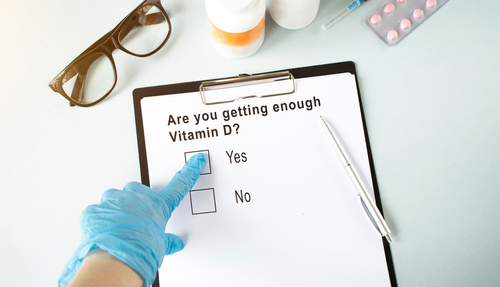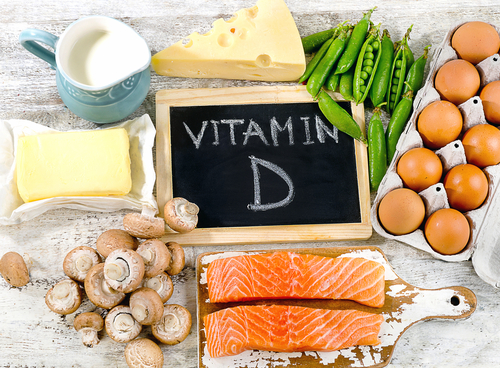Are You Getting Enough of the "Sunshine" Vitamin?
It is the time of year when we have been staying inside and not getting our daily sunshine. This lack of sunshine can affect how we feel, the activities we participate in, and other habits that contribute to our good health. The rays of the sun play a vital role in our health. Not only do they motivate us to get outside to be more active but they also help our bodies produce vitamin D.
Vitamin D is known to be important for bone health but new research shows that it is also important for reducing inflammation, improving the immune system and glucose metabolism, and even helping to reach a healthy weight. When sunshine is scarce or the weather isn’t ideal for sitting outside, we may have to get creative in ways to boost our body’s supply of this vitamin. Few foods naturally contain vitamin D and supplements may not be a good choice.
Read on to learn more about the “sunshine” vitamin and ways to soak up its benefits, even during the cold and dreary months.
The Sunshine Vitamin
Vitamin D is a fat-soluble vitamin that plays several important roles in the body, including maintaining the health of your bones, teeth and joints, and assisting immune system function. Vitamin D is found in certain foods and is produced by the body in response to exposure to the sun. The Recommended Dietary Allowances (RDAs) for vitamin D are 600 IU for people ages 19-70 years, and 800 IU for people over 70 years old.
When the sun’s ultraviolet-B (UVB) rays are exposed to bare skin, the body converts a cholesterol derivative into Vitamin D. In fact, we now know that every cell and tissue within the body has a Vitamin D protein receptor.
In the northern areas of the United States, many people are deficient in Vitamin D including many patients with Type 2 Diabetes. This is due to limited sunlight exposure caused by a number of factors including more time spent at home, in the office or car, shorter sunny days in the winter, sunscreen use in the summer, and fears of skin cancer.
Types of Vitamin D
There are two forms of this vitamin: vitamin D2 (ergocalciferol) and vitamin D3 (cholecalciferol). Vitamin D2 is a plant source of vitamin D naturally found in mushrooms. When the skin is exposed to ultraviolet light, it produces Vitamin D3 naturally. Vitamin D3 can also be found naturally in some foods including fatty fish (e.g., salmon, tuna, and mackerel), fish liver oils, and egg yolk. In milk, vitamin D3 is the form commonly added.
Vitamin D is important, along with calcium, for keeping bones healthy. Eating vitamin D-fortified foods, like milk, orange juice and certain breakfast cereals, as well as natural sources like fatty fish, can help people achieve the recommended amount of vitamin D needed for good health.
Over the years, there have been conflicting views in scientific literature as to whether D2 and D3 are equally effective at increasing and maintaining blood levels of vitamin D. According to the National Institutes of Health Office of Dietary Supplements, no firm conclusions can be drawn about the different effects of vitamin D2 and D3.
Vitamin D Deficiency
The signs of Vitamin D deficiency can range from bone pain and muscle weakness to depression and a weakened immune system, while longer-term deficiency can result in obesity, high blood pressure, psoriasis, osteoporosis, chronic fatigue, Alzheimer’s disease, cancer, and Type 2 Diabetes.
Anyone can have vitamin D deficiency; however, it is more common in people with darker skin and people who cover their skin when outdoors. Certain medical conditions, weight loss surgery, and certain medications can also increase your risk for inadequate vitamin D levels.
It is estimated that 1 billion people worldwide have vitamin D deficiency and 50% of the population has insufficient vitamin D. In the United States, approximately four in ten adults have a deficiency.
Exposing your skin to the sun for 15-20 minutes each day can help increase your body’s production of vitamin D, reducing your risk of diabetes and other serious medical conditions. However, in the winter many of us get minimal time in the sun. Therefore, a great way to get your daily intake of vitamin D is through foods such as mushrooms, nuts, oily fish, eggs, fortified milk, cheese and yogurt, fortified orange juice, and some fortified cereals.
Here at Seattle Sutton, we know the importance of consuming all your vitamins and minerals from food, however if your Physician finds you are deficient in Vitamin D, a supplement may be recommended.
Vitamin D and Diabetes
Vitamin D is believed to help improve the body’s sensitivity to insulin- the hormone responsible for regulating blood sugar levels- therefore reducing the risk of insulin resistance, which is often a precursor to Type 2 Diabetes. Some scientists also believe this vitamin may help regulate the production of insulin in the pancreas.
One study found that higher vitamin D levels were tied to a lower risk of insulin resistance and that the likelihood of developing insulin resistance went down with each additional amount of vitamin D supplement taken. They thought that vitamin D3 may be protective because of its role in lowering inflammation.
The Vitamin D Council places the ideal level between 40 and 80ng/mL with levels below 20ng as deficient. However, it is now known that raising the amount of vitamin D in your body to around 60-80ng/mL can help keep blood glucose levels under control, which is vital for people with diabetes.
*Note: the correct level of vitamin D varies from person to person. The only way to be sure that your vitamin D levels are where they should be is to request a 25-hydroxyvitamin D, or 25(OH)D, blood test from your Physician.

Vitamin D and Weight Loss
Studies have shown that obesity increases with vitamin D deficiency. In particular, one study that looked at the effect of supplementation on weight loss in obese and overweight women found that after 6 weeks of supplementation, weight, waist circumference, and BMI were all significantly decreased and vitamin D levels increased significantly.
Overweight people tend to have lower levels of vitamin D. This may be due to more time indoors, lower intake of foods high in vitamin D, covering up more when outside, and possible issues with absorbing vitamin D. It is also thought that obese people may have higher needs for vitamin D than people of normal weight. Some experts suggest that overweight people may need 1.5 times more vitamin D and obese people 2-3 times more.
There are many theories as to why vitamin D may help with weight loss. It may alter the storage and formation of fat cells and affect certain neurotransmitters and hormones in the body, which may help promote a healthy weight. It is also thought that weight loss in general helps to increase vitamin D levels.
It’s important to remember that just taking vitamin D supplements will not result in weight loss, it is not a magic bullet. However, getting outside more, eating more vitamin D-rich foods, and taking a supplement if recommended may help you in your efforts of reaching and maintaining a healthy weight.
Seasonal Affective Disorder (SAD)
Do you notice a change in your mental state with the seasons? Seasonal Affective Disorder is a condition where people notice changes in their mood at certain times of the year, usually in the fall and winter months. Individuals who experience SAD often notice fluctuating emotions and drained energy levels, which usually go away as the seasons change. SAD can also lead to higher carbohydrate cravings and sleeping more.
Vitamin D deficiency does not cause SAD but low levels of vitamin D have been found in people with this condition. It is interesting because like vitamin D deficiency, SAD is more common in people who live farther from the equator. It is also more common in women and younger people than in older age.
The most common treatment for SAD includes antidepressants, talk therapy, and light therapy. For light therapy, the recommendation is to sit with a bright artificial light for 20-60 minutes each morning. Light therapy has been found to have similar effects on SAD as medication or talk therapy.
At this time, it is unclear if vitamin D supplements help to resolve SAD however focusing on getting more sunshine and eating a healthy diet, including a variety of vitamin D-rich foods, can produce many benefits which could help improve energy levels and mood. One study did find that vitamin D supplementation improved depression in people with SAD as effectively as light therapy and found no unwanted side effects.
Our bodies feel better when it is fueled with a healthy diet and getting regular physical activity. Whether you are dealing with diabetes, inflammation, weight concerns, or SAD there are certain steps you can take to improve your health and feel your best. Focus on eating fatty fish at least twice a week to provide your body with vitamin D and omega-3 fatty acids. Ensure your dairy or dairy alternatives are fortified with vitamin D. Talk to your doctor about a supplement during the winter months and try to get some sunshine every day if possible.
With Seattle Sutton’s Healthy Eating, we provide you with fatty fish on the menu twice a week and encourage regular servings of vitamin D-rich dairy products.


